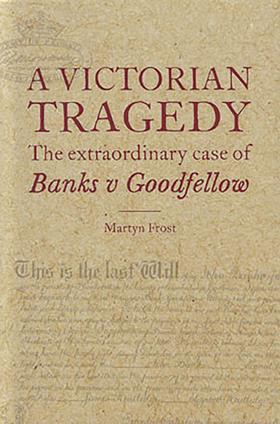A Victorian Tragedy: The Extraordinary case of Banks v Goodfellow
By Martyn Frost
£19.99, Wildy, Simmonds and Hill Publishing
★★★✩✩

I have only once been asked whether there would be a reading of the will. They were common in films or plays where the family sat in the solicitor’s office, all dressed in black – and the elderly, wise, but somehow gruff lawyer, read out the deceased’s last will. The tension mounts. One by one legacies are announced to family servants but there is nothing for the grieving spouse or the prodigal son, but some money for the attractive assistant and the rest to a cats’ home. Legal life is not always that dramatic.
Supposing someone phones your office and asks if you do wills. ‘Yes’, you delightedly reply, and the client explains they want to leave all their money to a member of the royal family or the man in the moon. How do you advise your client about what they can and cannot do and who decides these questions? Has the client got capacity?
Some of the answers to these questions are set out in the case of Banks v Goodfellow which forms the basis of this book. That precedent laid out the test of testamentary capacity which remarkably has stood for 150 years.
In some ways it is a typical story of family litigation, madness, physical illness, and early death. It is a very well researched book on the background to this case, set in the 19th century Lake District town of Keswick. It is an interesting account of man with serious and lifelong mental health issues and how society dealt with these issues then. He looked mad, said a witness, so he must be mad.
The section on medical treatments for mental health problems is startling. It included bloodletting, blistering the skin and hot and cold baths. Another remedy was purging with laxatives using antimonial pills – metal pellets that were ingested. Families kept these pills for years, and they were passed from generation to generation.
However, the court’s treatment of the man and the issues were quite enlightened. The book also contains the appeal court’s judgment and potted biographies of the legal figures involved.
Like many court cases I wonder if any of the litigants had much joy from it. It is an interesting story told by an experienced lawyer and I look forward to more books like this. What about the snail in Donoghue v Stevenson?
David Pickup is a partner at Pickup & Scott Solicitors, Aylesbury































No comments yet